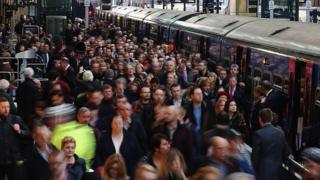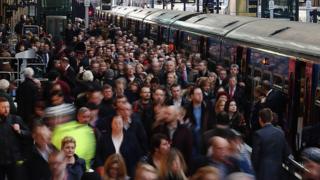Rail fares rise by 2.7%, hitting millions of commuters
Many passengers are facing an increase of more than £100 for annual season tickets. …

 Image copyright Dan Kitwood/Getty Images
Image copyright Dan Kitwood/Getty Images Millions of commuters will have to pay an average of 2.7% more for train tickets from today.
The rise, announced by industry body the Rail Delivery Group in November, is lower than the 3.1% increase at the start of last year.
Train companies say it is the third year in a row that average fares have been held below RPI – the inflation measure on which rises are based.
But many commuters face an increase of more than £100 for annual passes.
Transport Secretary Grant Shapps cited a new fund for trials for flexible fares as an example of how the government was committed to “putting passengers first”.
But Labour’s shadow transport secretary, Andy McDonald, said the rise showed passengers were “once again paying more for less under the Tories”.
Independent watchdog Transport Focus says most rail users (53%) do not feel train ticket prices offer value for money.
The watchdog’s director, David Sidebottom, said: “After a year of pretty poor performance in some areas, passengers just want a consistent day-to-day service they can rely on and a better chance of getting a seat.”
He encouraged passengers to claim compensation for eligible delays in order to “offset” the cost of fare rises.
Some annual season tickets up by more than £100
For example:
- Reading to London up £132 to £4,736
- Gloucester to Birmingham up £118 to £4,356
- Glasgow to Edinburgh up £116 to £4,200
However, Robert Nisbet, director of nations and regions for Rail Delivery Group, said rail companies were investing in improving journeys while holding fare increases below inflation.
He said 2020 will see 1,000 extra weekly services and 1,000 more carriages added to Britain’s rail fleet.
About 40% of annual rail price rises are regulated by governments in England, Scotland and Wales. They are pegged to the Retail Prices Index (RPI) inflation measure for the previous July. Other fare rises are decided by train companies.
RPI inflation was 2.8% last year.
But RPI inflation is generally higher than the most widely watched measure of inflation, the Consumer Prices Index (CPI).
Passenger groups have repeatedly called for the system to be changed since RPI inflation was abandoned by the National Audit Office as a national statistic in 2013.
Protests will be held against the fare increase on Thursday, including a demonstration outside London King’s Cross station.
The rallies come as the Trades Union Congress (TUC) releases research suggesting fares have risen by twice as much as wages in the last 10 years.
The TUC said someone earning an average salary in the UK would have to spend 16% of their wages for a season ticket from Chelmsford to London (£511 a month), but similar commutes would cost 2% of the average salary in France, and 4% in Germany and Belgium.



